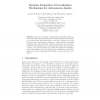Free Online Productivity Tools
i2Speak
i2Symbol
i2OCR
iTex2Img
iWeb2Print
iWeb2Shot
i2Type
iPdf2Split
iPdf2Merge
i2Bopomofo
i2Arabic
i2Style
i2Image
i2PDF
iLatex2Rtf
Sci2ools
108
click to vote
EPIA
2001
Springer
2001
Springer
Dynamic Evaluation of Coordination Mechanisms for Autonomous Agents
Abstract. This paper presents a formal framework within which autonomous agents can dynamically select and apply different mechanisms to coordinate their interactions with one another. Agents use the task attributes and environmental conditions to evaluate which mechanism maximises their expected utility. Different agent types can be characterised by their willingness to cooperate and the relative value they place on short- vs long-term rewards. Our results demonstrate the viability of empowering agents in this way and show the quantitative benefits that agents accrue from being given the flexibility to control how they coordinate.
Artificial Intelligence | Autonomous Agents | Different Agent Types | EPIA 2001 | Vs Long-term Rewards |
Related Content
| Added | 28 Jul 2010 |
| Updated | 28 Jul 2010 |
| Type | Conference |
| Year | 2001 |
| Where | EPIA |
| Authors | Rachel A. Bourne, Karen Shoop, Nicholas R. Jennings |
Comments (0)

